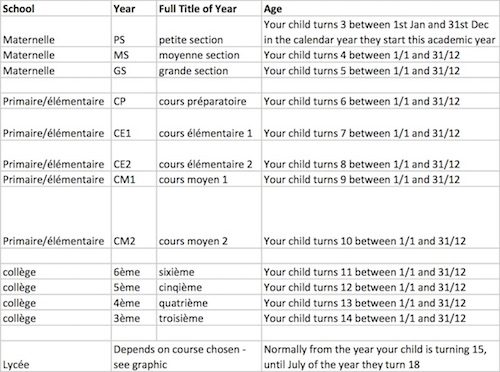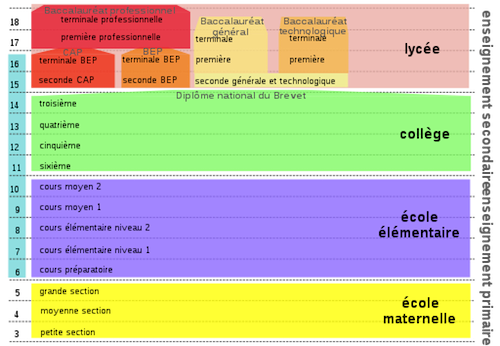There are plenty of well-written articles explaining the French school system – but I struggled with understanding school years, and finding information on choosing schools.
Similar to in the UK, if you opt into the state school system in France, the default is for your child to go into the school closest to your home. So, like in the UK, those who can move into areas that have good schools. But how to find out which schools are good in France? This article gives you some links and pointers to help you find your way with choosing schools in France.
The focus is on state schools, but links provided also give valuable insight into private collèges and lycées.I’m not going to repeat information here that others have written about eloquently and helpfully concerning French school – but I will link you to the best information I’ve found where relevant.
The article aims to provide some advice, and where I’ve found it, resources, on choosing schools.
School Years & Ages
In France, although the academic year runs September to July, the class your child belongs in depends on the age they turn in the calendar year the academic year starts.
Note that if your child’s birthday falls before the academic year starts then they may start AT the age for their year – so if they are going into CP they may already be 6. Or they might still be 5 when they start, turning 6 by 31st December.


School Is Local
France are big on primary schools and often even pretty small villages will have an école primaire (also called élémentaire), along with a Maternelle.
Larger towns will have more than one, which might give you a little more choice. However usually you will be given a place for your child at the school closest to where you live, within a catchment zone.
There are school catchment zones. This is called the ‘carte scolaire’ – school map. You can apply to put your child in a specific school out of your zone, and you’d be expected to have a reason for that e.g. You work close by that school, you pass it on the way to your work meaning dropping off and picking up is easier for you – and things would be tricky for the family if your child went elsewhere.
“If you want your child to go to a school outside of your area, you’ll need to have a good reason and get permission from your local mairie (town hall) and the rectorat (schools inspectorate). In Paris, non-French-speaking children may be sent to a school that has language integration support, if available.”
Expatica.com
Live Near The School You Like
Really the best way to ensure your child gets into the school you want them to do go is to live near it. But how do you know which schools are any good?
No Official Guide
OFSTED (the UK’s government-run school assessment and ranking that is publicly available) doesn’t exist, and there is no government site you can visit that will tell you anything truly insightful about primary schools. More about what there IS later, but being proactive is best. Find some chatty parents in the area and bend their ears! Facebook groups can be brilliant. Search and see if you can find an ‘expat’ Facebook group for the town or area, and tap into that. Expat sites just like this one can also be excellent resources. Just ask as much as you can for someone- who-knows-someone-who-knows-something about the place you’re planning on moving to.
Horror Stories – and the reverse
Trawl the internet and you’ll soon find some scary stories about awful French public schools with teachers who do nothing but yell, have no sympathy for special needs and lack any kind of empathy. People who have those sorts of experiences seem to blog about them more than those who have positive experiences! But my recommendation is to take those seriously – I’ve heard first-hand about schools like that and I do think you need to look out for them, but by no means are all French state schools like that. I know of, and know personally, of lots of people whose children are having a wonderful time in a public primary school. Mine included!
In her 2010 article in the UK’s The Guardian newspaper, writer Emily Barr says “School in France has no assembly, no school plays, no music, no clubs.” This is not our experience, nor that of friends in other areas. True, there is no assembly, and I do think this would help with the sense of community at school. But our children work all term on items that they present at their end of term ‘Spectacle’, often items they work at in their after school clubs (T.A.P.), which they attend three days out of five. They have T.A.P. from 3.30 until 4.30 – these are free activities after lessons are finished and they have an amazing choice every term. Chocolate making, marionettes, dance, video making, arts and crafts, choir, games club, capoeira and all sorts. Please don’t ask what T.A.P. stands for as I have no idea! I’ve tried Googling it but to no avail, the children don’t know either!
There are further clubs our children can join beyond T.A.P. times, which you need to pay for: Judo, art class, climbing club, some music lessons options and more. Everyone is included in the end of term Spectacle which normally at least includes singing one song they’ve learnt in class time as well as their other bits and bobs. It’s true they don’t seem to do very much art in class time, and little music, but they do some. This doesn’t differ much from the UK primary school my children attended, where Arts appeared in the curriculum in special weeks, rather than necessarily happening regularly every week.
Choosing a Primary School
(école élémentiare / école primaire)
We are in the process of moving to a new area, and choosing a primary school is one of the things we need to do. I have the advantage of knowing someone in the area who knows lots of other people. But of course I want to reassure myself. There is only so much you can do, but I would suggest:
Contact the school direct. Although schools are administered by the local Mairie and the ‘Directeur’ is more of an administrator in many cases, they are also, to a degree, in charge. In our current town the Directeur has a bit more to for – like teaching for a start – as we’re more remote.
Contact the school and try to set up a chat with the Directeur, and ask if you can be shown around the school. This will immediately give you a sense of the establishment. Abrupt Directeur who puts you off and can’t be bothered? Hmmm. Friendly Directeur who understands where you’re coming from and wants to help? Hopeful. Gushingly welcome? Jackpot!
If a visit isn’t possible, or it’s too soon in the process, why not walk past at break time – ‘recreation’? This is my plan as the area we are planning to move to has various villages and small towns I’d be happy to settle in – each with its own École Primaire. If we wander past at break time to hear screaming teachers and miserable pupils, or witness lots of rough behaviour etc, we might want to find out a bit more and give that town a miss. If we hear happy children with teachers being the kinds of teachers we like – strict but fair and kind, then it’s a goer. It’s a basic measure, but I do think you can get a sense of a school from these things.
Collège
We have one child about to enter collège, or middle school. Choosing this school is more tricky as there are fewer collèges and children are generally bussed in from the surrounding area. Thus I want to know that we’re in the right area for a good collège. This feels trickier as collège is more academic and a big step up from primaire.
No OFSTED in France
Although there is no OFSTED in France, the government recently agreed to release exam results for collèges and lycées – including private schools, which gives us parents half a clue about where might be good to send our children. This site gives statistics on the performance of collèges and lycées over the past years, and awards one, two or three ‘Palmes’ for the best performing schools. You can see if the school is steady, improving, or getting worse. It doesn’t tell you if the students are happy, but my reasoning is this:
1/ A school with a steady upwards trend is a good bet, especially if it’s had a palme or more for a year or two
2/ A school with a steady, good record, is a good bet. Especially if it’s in the palmes.
3/ A school whose record is a bit all over the shop – good one year, down the next, then up again etc, doesn’t smack of a steady school.
4/ If the arrow’s pointing down and the numbers are significantly different, find out why, or give it a miss.
Grades Only Tell You So Much
Having researched the collèges around the area we are moving to, I set my heart on one whose statistics are just a little below the level of the nearest palme-awarded collège, but with steady numbers and an upward trend. My reason was that this collège is in a more rural location and seems small and friendly, and I felt that this would suit my daughter best. Basically, I just fell in love with it! But if it had turned out that we could only find a house to rent that put her in the catchment for the Palme rated collège in a slighter bigger (but still small) town, I would have been quite happy. My point here is that the grades only tell you so much about a school, being on site to see it, feel it and smell it contributes to your decision too.
Lycée
Some collèges and lycées share a campus & facilities, so if your child is happy in the collège it’s easy to keep them and move them through into lycée. Other collèges and lycées are separate. I haven’t got too far with lycée choices, except to look at a map! There will probably be one in your area that you’ll find most of the collège students filter into. As standard French private school fees are very low (these are schools contracted to the government, who pay the teachers’ salaries) we will consider private school choices at lycée, partly just to give us more choices, but also for smaller classes and less travel time – assuming there’s a private one nearer our home.
“It is worth noting that certain primary schools are “feeder” schools for certain secondary schools which in turn feed into certain “lycées”. This means places are granted to pupils from feeder schools in preference to those coming from elsewhere. Pressure for places in a school is not particularly a factor at the primary level (as numbers have generally been declining) however there may well be pressure at the secondary level. Therefore, the earlier you can contact a prospective school the better.”
Frenchentree.com
I hope you’ve found this helpful. To finish I’ll leave you with links to some of the most helpful articles I’ve read on French schools and the French school system
http://www.expatfocus.com/10-useful-facts-about-schooling-in-france
https://www.frenchentree.com/living-in-france/education/school-selection/
https://www.frenchestateagents.com/living-in-france-the-french-school-system
https://www.frenchentree.com/living-in-france/education/how-good-is-my-local-school-in-france/

